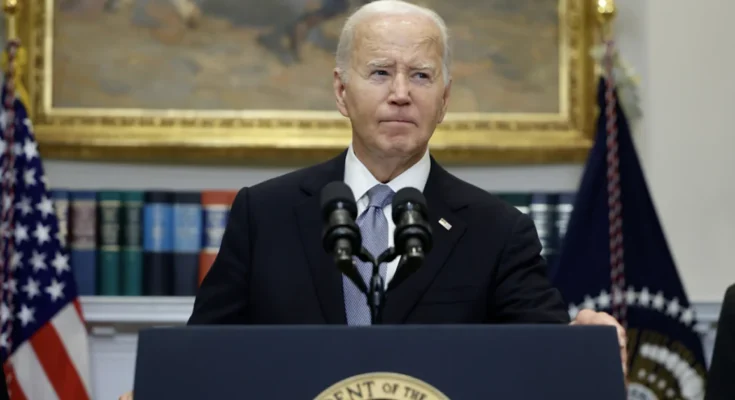In a surprising turn of events, President Joe Biden has officially announced that he will not be seeking reelection in 2024. This decision has sent shockwaves through the political landscape, as many expected the sitting president to campaign for a second term. Biden’s announcement comes amid concerns raised by Democrats regarding his age and ability to effectively serve another term, particularly following a challenging debate performance.
Biden’s Decision to “Stand Down”

On Sunday, President Biden released a statement that took many by surprise. He declared that he would “stand down” from seeking reelection and instead focus on fulfilling his duties as President for the remainder of his term. This decision marks a significant moment in his political career, as it shifts the focus toward what his legacy will be and who might step up to lead the Democratic Party in the 2024 election.
Concerns About Age and Performance
One of the main factors contributing to Biden’s decision not to seek reelection is the growing concern about his age. At 81 years old, Biden would have been 86 by the end of a second term if reelected. Many within the Democratic Party have expressed unease about the feasibility of Biden serving a second term, especially given the physical and mental demands of the presidency.
These concerns were exacerbated by Biden’s performance in recent debates, where critics argued that he appeared fatigued and struggled to articulate his policies clearly. Some Democrats feared that continuing to support Biden for a second term could jeopardize their chances of retaining the White House in 2024.
Impact on the Democratic Party
Biden’s decision not to seek reelection has significant implications for the Democratic Party. With the 2024 election fast approaching, the party must now identify a new candidate who can unite the various factions within the party and appeal to the broader electorate. This situation opens the door for potential candidates such as Vice President Kamala Harris, Senator Elizabeth Warren, or even former presidential candidate Pete Buttigieg.
However, the party faces the challenge of rallying behind a candidate who can build on Biden’s accomplishments while addressing the issues that have caused concern among voters. The Democrats will need to ensure that their chosen candidate can effectively communicate a vision for the future that resonates with Americans across the political spectrum.
Biden’s Legacy
As Biden prepares to complete his term, attention will inevitably turn to his legacy as president. His administration has faced a series of challenges, including the COVID-19 pandemic, economic recovery efforts, and a deeply polarized political environment. Despite these hurdles, Biden has achieved significant milestones, such as passing the American Rescue Plan, advancing infrastructure legislation, and restoring international alliances.
Biden’s decision to step down from seeking reelection may be seen as a recognition of the importance of ensuring that the Democratic Party remains strong and capable of addressing the country’s challenges. By focusing on his duties for the remainder of his term, Biden may seek to solidify his legacy as a leader who prioritized the nation’s needs over personal ambition.
The Path Forward
With Biden’s decision now public, the focus shifts to the future of the Democratic Party and the 2024 election. The party will need to navigate the complexities of choosing a new candidate while addressing the concerns that led to Biden’s decision. This moment represents both a challenge and an opportunity for the Democrats to redefine their platform and appeal to a diverse electorate.
As the 2024 election approaches, the American people will be watching closely to see who steps forward to lead the country in the next chapter. Biden’s decision not to seek reelection has set the stage for a potentially transformative election, one that could reshape the political landscape for years to come.
FAQs
1. Why did President Biden decide not to seek reelection?
- President Biden decided not to seek reelection due to concerns about his age and ability to effectively serve a second term, particularly after a challenging debate performance.
2. What are the implications of Biden’s decision for the Democratic Party?
- Biden’s decision opens the door for other potential candidates to step up and lead the party in the 2024 election. The Democrats will need to rally behind a new candidate who can build on Biden’s accomplishments while addressing voter concerns.
3. Who are potential candidates to run for president in 2024?
- Potential candidates include Vice President Kamala Harris, Senator Elizabeth Warren, and former presidential candidate Pete Buttigieg, among others.
4. What has Biden achieved during his presidency?
- Biden’s administration has achieved significant milestones, such as passing the American Rescue Plan, advancing infrastructure legislation, and restoring international alliances.
5. How will Biden’s decision impact the 2024 election?
- Biden’s decision not to seek reelection will significantly impact the 2024 election by setting the stage for a new Democratic candidate to emerge and potentially reshape the political landscape.



